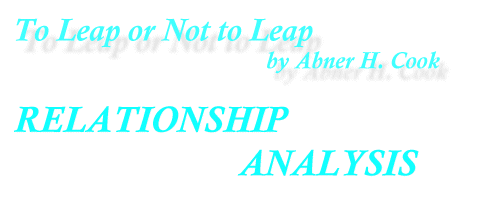
 Everyone is afraid of the unknown. To take a step,
become involved with or make a commitment to something for which the outcome is uncertain,
involves some kind of a risk. To risk means to give up something which is known; something that is
comfortable and secure has to be forfeited in order to take a leap into something for
which there is no absolute certainty as to the outcome. In other words, to risk means
to take a jump into something with no assurance that you might be better off for having
taken the risk.
Everyone is afraid of the unknown. To take a step,
become involved with or make a commitment to something for which the outcome is uncertain,
involves some kind of a risk. To risk means to give up something which is known; something that is
comfortable and secure has to be forfeited in order to take a leap into something for
which there is no absolute certainty as to the outcome. In other words, to risk means
to take a jump into something with no assurance that you might be better off for having
taken the risk.
To be insecure or have doubts about committing yourself to someone else is both a healthy and normal feeling to have.
There is no guarantee that every relationship formed will last. There is always the possibility that one or both persons
may experience some hurt and/or rejection. Just as there is always an element of risk involved in initiating a new friendship,
there is also an element of fear present. Fear serves an important function in the decision making process:
fear is the force which reminds you of your unsuccessful past, recalls the lessons learned and prevents you from rushing into
anything prematurely without doing some careful examination. Just as a small amount of fear is necessary to prevent foolish
ventures, excessive fear is both unhealthy and dangerous because it prevents you from taking necessary risks to gain what it is you want.
While there can be no absolute guarantee that a relationship (whether it's a steady dating agreement, engagement to be married
living together arrangement or a marriage) will be successful and lasting, there are ways to ensure the best possible odds of
lasting success. By asking yourself these questions and spending much time and thought to the answers you give, you are
allowing yourself to have the knowledge that is necessary to make the decisions which will serve you best. Remember,
relationships should be rewarding, enriching, and a growing experience where each person serves the other as well as
himself/herself. Desperate, dependent clinging relationships seldom work out because the central focus of the purpose of being
together is the desperation and neediness. In order to have the best possible bond with another person, you have to believe in
your best self, trust that you are worthy and know that you are loving and
loveable. When you come from that part of you
which is your best self, you are able to give freely to another the love that enriches the two of you and to know that your love is
full and complete and not lacking for anything.
In order to get the most of these questions, it is strongly recommended that you get yourself a portable cassette recorder
with a remote microphone switch. Before you start to work on the questions, make yourself comfortable and relaxed and then
read the questions into the recorder, one at a time. Do not turn the machine off - let your pauses be the information you need to
be aware of your defenses which are preventing you from understanding the truth present in your association with the other person.
Here are the questions to ask:
1. What will happen if I commit myself to this person?
2. Does the other person understand the commitment and relationship in the same way I do?
3. What do I want from the other person?
4. Can the other person give me that?
5. Have I ever been close to anyone else?
6. What is different about this time and situation?
7. What events are becoming urgent now?
8. How do I know I am serious about my feelings?
9. How do I know the other person is serious about his/hers?
10. How much do I care about the other person's feelings?
11. How much does he/she care about mine?
12. Can I trust the other person?
13. Does the other person trust me?
14. What can go wrong between us?
15. What do I like least about the other person?
16. Does the other person know that?
17. What would I not share with the other person?
18. Do I need the other person to be complete?
19. Do I feel complete by myself?
20. Am I free to say "no"?
21. Do I have to give up something or to change in order to love the other person?
22. What does the other person know about me that would hurt either of us?
23. What would make me give up the other person or make the other person give up me?
24. What do I expect of the other person?
25. What does the other person expect of me?
26. What is more important to me than this relationship?
27. Can I be myself and still be loved in this relationship?
Abner Cook is a former member and Member Emeritus of Video Introductions.
Abner followed his own advice and is now happily married.

"...a failure of persons to honestly represent who they are...
a facade is created, designed to please what you think that
the other person needs or wants. You lose either way if you do this!
If the person responds to the facade, you've got nothing
there but a person who likes the false image you've created.
That person doesn't like you, so what have you gained?
If the person does not respond to the facade and departs
from your life...you're always going to wonder if he (or she)
would have liked you, had you been genuine."
-Norman Mickey "Compatibility and Finding That Perfect Mate"
Video Introductions Workshop, 1st National Singles Convention, 1979
Want to consider becoming a Video Introductions member? How to join
Return to Relationship Tips


 Everyone is afraid of the unknown. To take a step,
become involved with or make a commitment to something for which the outcome is uncertain,
involves some kind of a risk. To risk means to give up something which is known; something that is
comfortable and secure has to be forfeited in order to take a leap into something for
which there is no absolute certainty as to the outcome. In other words, to risk means
to take a jump into something with no assurance that you might be better off for having
taken the risk.
Everyone is afraid of the unknown. To take a step,
become involved with or make a commitment to something for which the outcome is uncertain,
involves some kind of a risk. To risk means to give up something which is known; something that is
comfortable and secure has to be forfeited in order to take a leap into something for
which there is no absolute certainty as to the outcome. In other words, to risk means
to take a jump into something with no assurance that you might be better off for having
taken the risk.